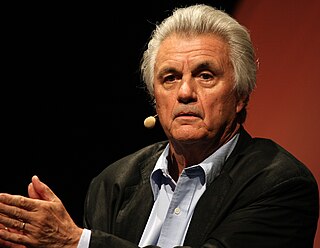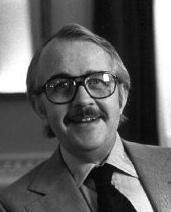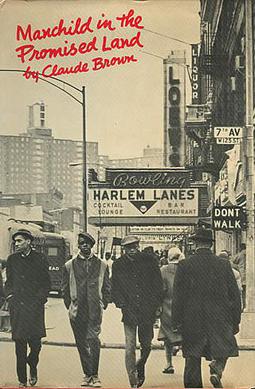The Booker Prize, formerly the Booker Prize for Fiction (1969–2001) and the Man Booker Prize (2002–2019), is a literary award conferred each year for the best novel written in the English language, which was published in the United Kingdom and Ireland. The winner of the Booker Prize receives international publicity that usually leads to a sales boost. When the prize was created, only novels written by Commonwealth, Irish, and South African citizens were eligible to receive the prize; in 2014, eligibility was widened to any English-language novel—a change that proved controversial.

John Winslow Irving is an American-Canadian novelist, short story writer, and screenwriter.

Michael John Harrison, known for publication purposes primarily as M. John Harrison, is an English author and literary critic. His work includes the Viriconium sequence of novels and short stories (1971–1984), Climbers (1989), and the Kefahuchi Tract trilogy, which consists of Light (2002), Nova Swing (2006) and Empty Space (2012).

Shaft is a 1971 American blaxploitation crime action thriller film directed by Gordon Parks and written by Ernest Tidyman and John D. F. Black. It is an adaptation of Tidyman's novel of the same name and is the first entry in the Shaft film series. The plot revolves around a private detective named John Shaft who is hired by a Harlem mobster to rescue his daughter from the Italian mobsters who kidnapped her. The film stars Richard Roundtree as Shaft, alongside Moses Gunn, Charles Cioffi, Christopher St. John and Lawrence Pressman.

John Gerard Braine was an English novelist. Braine is usually listed among the angry young men, a loosely defined group of English writers who emerged on the literary scene in the 1950s.

James Kirkwood Jr. was an American playwright, author and actor. In 1976 he received the Tony Award, the Drama Desk Award for Outstanding Book of a Musical, and the Pulitzer Prize for Drama for the Broadway hit A Chorus Line.

Ernest Ralph Tidyman was an American author and screenwriter, best known for his novels featuring the African-American detective John Shaft. He also co-wrote the screenplay for the film version of Shaft with John D. F. Black in 1971.

John Shaft is a fictional private investigator created by author/screenwriter Ernest Tidyman for the 1970 novel of the same name. He was portrayed by Richard Roundtree in the original 1971 film and in its four sequels, Shaft's Big Score! (1972), Shaft in Africa (1973), Shaft (2000) and Shaft (2019), and the seven 1973–74 Shaft television films, with Samuel L. Jackson portraying his son, named John Shaft II, in Shaft (2000) and Shaft (2019), and Jessie Usher portraying the character's grandson in Shaft (2019). The blurb on the paperback on which the original film is based states Shaft is "Hotter than Bond, cooler than Bullitt."
John Donald Francis Black was a screenwriter, TV producer, and TV director. He is best known for his work on the TV series Star Trek: The Original Series in 1966, and its sequel series, Star Trek: The Next Generation during the 1980s.

Shaft in Africa is a 1973 American blaxploitation film directed by John Guillermin, and the third film of the Shaft series, starring Richard Roundtree as John Shaft. Stirling Silliphant wrote the screenplay. The film's budget was $1.5 million, but the film was a box office flop, grossing just $1 million. Metro-Goldwyn-Mayer quickly sold the property to television, but the television series was cancelled after just seven episodes.

Shaft's Big Score! is a 1972 American blaxploitation action-crime film starring Richard Roundtree as private detective John Shaft. It is the second entry in the Shaft film series, with both director Gordon Parks and screenwriter Ernest Tidyman reprising their roles from the first film. Moses Gunn and Drew Bundini Brown also return from the previous film, alongside new appearances from acting veterans Joseph Mascolo, Julius Harris and Joe Santos. Composer Isaac Hayes turned down an offer to score the film, so Parks, also a musician, composed and performed the score himself.

Thomas R. Perrotta is an American novelist and screenwriter best known for his novels Election (1998) and Little Children (2004), both of which were made into critically acclaimed, Academy Award-nominated films. Perrotta co-wrote the screenplay for the 2006 film version of Little Children with Todd Field, for which he received an Academy Award nomination for Best Adapted Screenplay. He is also known for his novel The Leftovers (2011), which has been adapted into a TV series on HBO.

Christine Elizabeth Clark, better known as Chris Clark, is an American soul, jazz, and blues singer, who recorded for Motown Records. Clark became known to Northern Soul fans for hit songs such as 1965's "Do Right Baby Do Right" and 1966's "Love's Gone Bad" (Holland-Dozier-Holland). She later co-wrote the screenplay for the 1972 motion picture Lady Sings the Blues starring Diana Ross, which earned Clark an Academy Award nomination.

Manchild in the Promised Land is a 1965 autobiographical novel written by Claude Brown. It chronicles the author's coming-of-age story amidst poverty and violence in Harlem during the 1940s and 1950s. Published at the height of the civil rights movement, the book reached far beyond the traditional literary world, drawing new attention to the lives of those living in urban environments. It has sold more than 4 million copies and has been translated into 14 languages.
Claude Brown was the author of Manchild in the Promised Land, published to critical acclaim in 1965, which tells the story of his coming of age during the 1940s and 1950s in Harlem. He also published Children of Ham (1976).
Magazine Management Co., Inc. was an American publishing company lasting from at least c. 1947 to the early 1970s, known for men's-adventure magazines, risque men's magazines, humor, romance, puzzle, celebrity/film and other types of magazines, and later adding comic books and black-and-white comics magazines to the mix. It was the parent company of Atlas Comics, and its rebranded incarnation, Marvel Comics.
The New CBS Tuesday Night Movies was a weekly 90-minute motion picture made expressly for television. The series aired on CBS from 1971 to 1974. During its first two seasons, the program was similar to ABC's Movie of the Week, which presented a brand-new full-length feature film in a regular weekly time slot with no connecting theme or arc among the films. In the fall of 1972, the series moved from Friday nights to Tuesdays, with its Friday night slot given back to traditional previously released theatrical films under The CBS Friday Night Movies banner.
Howard Street is a 1968 novel by Nathan C. Heard. Howard Street was first published in 1968/ in hard copy by Dial Press. The paperback was published the same year by Signet Books. After the first publishing in 1968, over one million copies of the book were sold. Howard Street was Heard's first novel, and was published "shortly before he was released from jail."
Phillip George Rock was an American actor, author and screenwriter.












